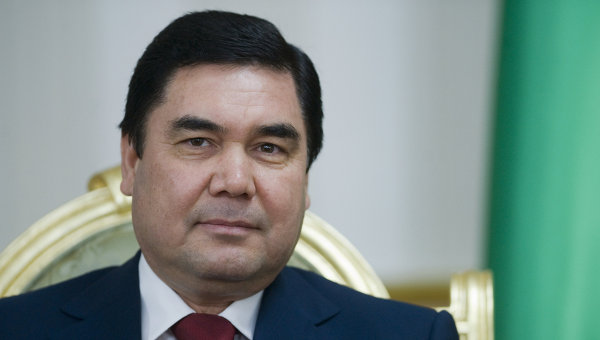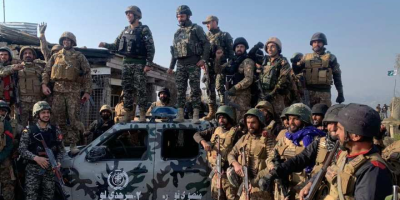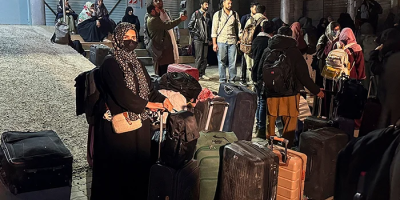Turkmenistan one of the most repressive counties in the world. HRW report

World Report 2014: Turkmenistan
Turkmenistan remains one of the world’s most repressive countries. The country is virtually closed to independent scrutiny, media and religious freedoms are subject to draconian restrictions, and human rights defenders and other activists face the constant threat of government reprisal. The government continues to use imprisonment as a tool for political retaliation. The release of several political prisoners and the adoption of some new laws that some have hailed as “reform,” have barely dented this stark reality.
Cult of Personality, No Pluralism
President Gurbanguly Berdymukhamedov, his relatives, and associates enjoy unlimited power and total control over all aspects of public life in Turkmenistan. Berdymukhamedov’s cult of personality continued to grow in 2013. His portraits permeate the country.
After Berdymukhamedov led a mass bicycle ride in August, civil servants and students were pressured to purchase bicycles at high prices. The government often forces people, sometimes by the thousands, to gather for hours for events attended by Berdymukhamedov. They are not permitted to leave, even to use the toilet.
In a June 2013 by-election, Ovezmammed Mammedov, chairman of the Party of Industrialists and Entrepreneurs, became the first parliamentary deputy who is not a member of the ruling party. Founded by a close associate of Berdymukhamedov, with the government’s active involvement, Mammedov’s party presents no alternatives to government policies.
Civil Society
Repressive government policies make it extremely difficult for independent nongovernmental organizations (NGOs) to operate. Civil society activists and journalists, including those living in exile and their families in Turkmenistan, face a constant threat of government reprisal. NGOs are legally banned from carrying out any work unless they are registered, yet no independent NGO has obtained registration in the past five years.
A January 2013 presidential decree required all foreign grants to be registered with the government. Funding proposals require at least five layers of government approval, including a government assessment that assistance in the proposed area is desirable. Funding for “political” activities is prohibited.
Freedom of Media and Information
In December 2012, parliament adopted a law banning censorship and affirming citizens’ right to freedom of expression and information. In practice, however, there is a total absence of media freedom in Turkmenistan. The state controls all print and electronic media, with the exception of one newspaper founded by an individual close to Berdymukhamedov.
Lack of access to Turkmenistan makes foreign media coverage very difficult. In May 2013, police arrested Rovshen Yazmuhamedov, a local correspondent for Radio Free Europe/Radio Liberty who reported on social issues and whom authorities questioned after his articles generated online reader responses. After two weeks of international pressure, the authorities released Yazmuhamedov. The reason for his detention remains unknown.
An example of conspicuous state interference with freedom of information occurred in April 2013, when Berdymukhamedov fell off his horse during a hippodrome race. Security forces forced spectators to delete from their cameras any image of the fall.
Internet access remains limited and heavily state-controlled. The country’s only Internet service provider is state-operated, and social media and many websites are blocked, including those of foreign news organizations.
Monthly Internet connectivity costs roughly US$100, making it inaccessible for many. Internet cafes require visitors to present their passports. The government is known to monitor electronic and telephone communications.
Freedom of Movement
Turkmenistan’s government continues to restrict the right of its citizens to travel freely outside the country by means of an informal and arbitrary system of travel bans commonly imposed on civil society activists and relatives of exiled dissidents. While a handful of persons previously banned from foreign travel were permitted to travel abroad in 2013, others were not, including family members of political prisoners.
Students studying abroad frequently face obstacles leaving Turkmenistan when returning to their studies. In September 2013, border officials prohibited, without explanation, several Turkmen students from leaving the country to return to Tajikistan to resume studies. Tajikistan’s Ministry of Education confirmed that no Turkmen students studying at Tajik universities have returned.
In June, the migration service announced it would issue new biometric passports to Turkmen citizens who also have had Russian passports since June 2003. However, according to the Turkmenistan Initiative for Human Rights, a Vienna-based group, these individuals report continued problems obtaining the new passports. The new passports are required for all travel abroad for all Turkmen citizens, with very few exceptions.
Freedom of Religion
No congregations of unregistered religious groups or communities are allowed, and religious communities have been unable to register for years. A new administrative offenses code, adopted in August 2013, establishes new fines for involvement in unregistered religious activity, although the amount of the fines will be known only when the code enters into force in 2014.
According to Forum 18, an independent international religious freedom group, in September 2013, police in Mary province summoned for questioning Ilmurad Nurliev, a Protestant pastor who was released from prison in 2012 after serving 18 months on bogus swindling charges. They questioned, harassed, and threatened him and others who signed an unsuccessful 2007 petition to register Nurliev’s congregation.
Forum 18 reported that in March, police in Lebap province raided the homes of several Protestant believers and confiscated their Bibles. Courts sentenced two of them to fines of twice the average monthly wage for possession of banned religious literature.
Forum 18 also reported that in January, police raided the home of a Jehovah’s Witness who had filed a complaint to the United Nations Human Rights Committee, detained and beat six visitors, and threatened one with rape. All were released, and a court fined three of the six for violating laws on religious literature.
Political Prisoners, Enforced Disappearances, and Torture
In February 2013, civil society activists Annakurban Amanklychev and Sapardurdy Khajiev were released from prison after fully serving nearly seven-year sentences on bogus weapons charges. Before their arrest, they had been affiliated with the Turkmenistan Helsinki Foundation, an exiled human rights group. Both suffer numerous health problems related to their incarceration.
Also in February, the authorities released two popular singers, Murad Ovezov and Maksat Kakabaev, sentenced on bogus charges in 2011 to five and seven years’ imprisonment respectively.
In July, authorities released Geldymyrat Nurmuhammedov, a former minister of culture and tourism, who had openly criticized the government and was forced to undergo nine months of forced drug rehabilitation treatment, despite having no history of drug abuse.
However, many others continue to languish in Turkmen prisons on what appear to be politically motivated charges. The actual number of those jailed on political grounds is impossible to determine because the justice system lacks transparency, trials are closed in political cases, and the overall level of repression precludes independent monitoring of these cases.
Political dissident Gulgeldy Annaniazov, arrested in 2008, remains imprisoned on charges that are not known even to his family. He is serving an 11-year sentence.
A decade after their arrest and show trials, several dozen persons convicted in relation to the November 2002 alleged assassination attempt on former President Saparmurat Niyazov remain victims of enforced disappearances. Some of those disappeared include former Foreign Minister Boris Shikhmuradov and Turkmenistan’s Former Ambassador to the Organization for Security and Co-operation in Europe (OSCE) Batyr Berdiev. Their fate is unknown, even to their families. Human Rights Watch is aware of longstanding unconfirmed reports that several defendants in the case have died in detention.
Torture remains a grave problem, particularly in high-security facilities. The International Committee for the Red Cross does not have full access to Turkmen prisons. The government has persistently denied access to the country for independent human rights monitors, including international NGOs and 10 United Nations special procedures.
Sexual Orientation and Gender Identity
Consensual sex between men is criminalized with a maximum prison sentence of two years. Turkmenistan rejected recommendations made during the April 2013 United Nations Universal Periodic Review to decriminalize consensual sex between adults of the same sex.
Key International Actors
After having had no active projects on Turkmenistan since 1997, the World Bank in July approved an interim strategy to provide analytical and technical services to Turkmenistan.
The upgrading of relations between the European Union and Turkmenistan, in the form of a Partnership and Cooperation Agreement (PCA), remained stalled. The European Parliament continued to postpone its necessary approval of the PCA, in part over human rights concerns. But there was no apparent effort on the part of the EU institutions to press for human rights reforms in exchange for the finalization of the agreement.
In November 2012, during her first trip to Central Asia, EU High Representative Catherine Ashton met with Foreign Minister Rashid Meredov to discuss energy and other issues. Ashton’s public statement noted that human rights concerns were also discussed, although she did not articulate them publicly. The annual EU-Turkmenistan human rights dialogue bore no concrete results.
In April, Turkmenistan was reviewed under the UN Universal Periodic Review. While Turkmenistan accepted most of the recommendations made by UN member states during the review, it rejected eighteen among the most pressing ones, five of which related to demands to release political prisoners or make known the whereabouts of prisoners who have disappeared in the country’s prison system.
In May, Assistant Secretary General for Human Rights Ivan Simonovic met with high-level officials in Turkmenistan, and emphasized the need for access to the country for UN special procedures.
Courtesy: Human Rights Watch report 2014
Related News

Pakistan eliminates Mid-level TTP leaders in cross-border strikes as Operation Ghazab-lil-Haq intensifies
RAWALPINDI, MAR 5 /DNA/: Security sources on Thursday confirmed that several mid-level leaders of theRead More

Pakistanis fleeing Iran describe strikes shaking ground under their feet
ISLAMABAD, MAR 5 /DNA/: Pakistanis fleeing Iran described explosions and missile strikes across Tehran shakingRead More


Comments are Closed